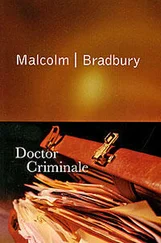Malcolm Bradbury - The History Man
Здесь есть возможность читать онлайн «Malcolm Bradbury - The History Man» весь текст электронной книги совершенно бесплатно (целиком полную версию без сокращений). В некоторых случаях можно слушать аудио, скачать через торрент в формате fb2 и присутствует краткое содержание. Жанр: Современная проза, на английском языке. Описание произведения, (предисловие) а так же отзывы посетителей доступны на портале библиотеки ЛибКат.
- Название:The History Man
- Автор:
- Жанр:
- Год:неизвестен
- ISBN:нет данных
- Рейтинг книги:3 / 5. Голосов: 1
-
Избранное:Добавить в избранное
- Отзывы:
-
Ваша оценка:
- 60
- 1
- 2
- 3
- 4
- 5
The History Man: краткое содержание, описание и аннотация
Предлагаем к чтению аннотацию, описание, краткое содержание или предисловие (зависит от того, что написал сам автор книги «The History Man»). Если вы не нашли необходимую информацию о книге — напишите в комментариях, мы постараемся отыскать её.
The History Man — читать онлайн бесплатно полную книгу (весь текст) целиком
Ниже представлен текст книги, разбитый по страницам. Система сохранения места последней прочитанной страницы, позволяет с удобством читать онлайн бесплатно книгу «The History Man», без необходимости каждый раз заново искать на чём Вы остановились. Поставьте закладку, и сможете в любой момент перейти на страницу, на которой закончили чтение.
Интервал:
Закладка:
The Kirks, then, were hardly Kirks; they were very private people, with almost no friends, innocent and silent with each other. They did not discuss problems, mainly because they did not see themselves as the sort of people who had problems; problems were things less mature people had. Barbara spent most of her time alone in the flat, cleaning and tidying it to excess, doing a small amount of unorganized reading. Their sexual relations seemed to bind them in the ultimate intimacy, to tell them why they were married to each other, prove what an intensity this thing called marriage was; but in fact they were, as they later came to reflect, poor, unenterprising, a nominal pleasure, an act of detumescence, further strained by the fear they both had of Barbara's getting pregnant, for the only contraception they used was the Durex that Howard timidly acquired at the local barber's, as well as by something else-a bite of irritation they each felt with the other, but which each denied to himself or herself, and never spoke about. 'What we were doing,' Howard started explaining after all this, when they started seeing themselves, in Howard's word, 'properly', when this stage was all over and they began talking things out between themselves, and with their friends and their enlarging circle of acquaintances, 'was trapping each other in fixed personality roles. We couldn't permit personal adventure, personal growth. That would have been disaster. We couldn't let any new possibilities develop, could we, kid? And that's how people murder each other in slow motion. We weren't adult.' Being adult came much later; the Kirks went on in much the same way for three years, while Howard worked, very thoroughly and ploddingly, at the detail of his thesis, and Barbara stared at herself in the mirror in the bedsitters and the flats. But then they found themselves in their middle twenties, with Howard's thesis and his grant coming to an end, and the need to think about the next move. And around this time something did happen to them.
What happened? Well, their saliva began to flow faster; everything started to get a new taste. The walls of limitation they had been living inside suddenly began to give way; they both started to vibrate with new desires and expectations. Their timidity, their anger, their irritation slipped, bit by bit, off them, like their old clothes, the tired shiny suits for Howard, the dull blouses and skirts for Barbara, which they discarded. By themselves, and with other people, their manner, their style, their natures freshened. They laughed more, and challenged people more. They confessed things to each other, in extreme bouts of frankness, and embarked on ambitious new schemes of sexuality. In bed they lay endlessly talking about themselves, till three and four in the morning; in the bath, on the landing, in the kitchen, they began to tweak, probe, and inject each other with all sorts of new passions and sexual intents. And what was it that had done this to the Kirks? Well, to understand it, as Howard, always a keen explainer, always explains, you need to know a little Marx, a little Freud, and a little social history; admittedly, with Howard, you need to know all this to explain anything. You need to know the time, the place, the milieu, the substructure and the superstructure, the state of and the determinants of consciousness, and the human capacity of consciousness to expand and explode. And if you understand these things you will understand why it was that the old Kirks faded from sight and the new Kirks came into being.
For, let us remember, here were two people who had grown up, though in two different Northern towns, one in Yorkshire and one in Lancashire, in the same class and value background. That background was one of vestigial Christianity and inherited social deference, the ideology, says Howard, of a society of sharply striated class distinctions and of great class-consciousness. They came, both of them, from well-conducted and more or less puritanical homes, located socially in that perplexing borderland between working-class anarchism and middle-class conformity. These were Chapel families, with high ethical standards and low social expectations; the result was an ethos in which ethics replaced politics, bringing about a mood of self-denial and deliberately chosen inhibition. Both of them, Howard and Barbara, had had their sights lifted by a grammar-school and university education, but they had retained toward that education the same attitude that their parents had held; it was an instrument, a virtuous one, for getting on, doing well, becoming even more respectable. In short, they had changed position without having changed values; and they had retained in detail the code of ethical constraint, decency and deference. They had been taught to be critical, but they had become critical only of each other, not of their environment or society; and they still retained in all their intimate values the reassuring, but self-limiting, standards of their families. They never asked, and they never received. And thus, says Howard, the nature of their psychological situation, and the consequential nature of their marriage, is all too clear and inevitable. They had married, it is quite evident in informed hindsight, in the adult modern vision, in order to reconstruct precisely that sort of family situation in which they had grown up. But they had done this in quite different historical circumstances from those that had shaped the choices of their parents. If they had looked around them, they would have seen that the energies of social freedom had changed their world; they had only to start claiming a fuller historical citizenship. Access was not denied as much as they believed, not for people like themselves, who had been chosen for élite privilege, and who had the chance to open up privilege for others, turn it into total entitlement, And thus they were failing themselves and everyone else: 'We were a disaster,' says Howard now.
And so the Kirks' marriage had become a prison, its function to check growth, not open it. Barbara, her education over, had promptly closed out her opportunities and reverted to being standard woman, a pre-Reichian woman geared to nothing else but the running of a house. The result was a characteristic syndrome of relative frigidity, suppressed hysteria, bodily shame, and consequential physical and social self-loathing. As for Howard, his way had been to progress and work hard in order to please others, never doing anything radical, negative or personal. He retained this solemn and industrious pattern in order to please his social superiors, but also even his own wife. 'I'd come home,' he says now, 'and show her drafts of my thesis where my supervisor had written "This is a great improvement" and expect her to…do what? Buy me a bicycle for achievement?' But it could hardly go on; and it didn't. For the Kirks moved through a world in which their pallid acceptance was becoming absurd, where self-suppressive achievement was being seen for what it was, weak conformity, psychic suicide. Historical circumstances were changing; the whole world was in transformation, undergoing a revolution of rising expectations, asserting more, demanding more, liberating itself. 'Our change just had to happen,' says Howard. 'The constraints were weakening in all departments: class, sex, work-ethics, everything. And man explodes. He finally has to realize his own change.'
'And woman,' says Barbara. And indeed it was, as Howard will very honourably tell you, Barbara who first broke the frame, in that crucial summer, crucial for them, of 1963. It was a year of social movement; Howard can detail for you, if you can stay around after, the manifestations, in spheres as various as popular music, political scandals, third-world politics, and industrial wage-bargaining, that made it so. Trapped in the flat, unhappy, bewildered, taking private snacks and therefore getting all too fat, she found the inherent contradiction first. 'She probed herself,' says Howard. 'That's not quite exactly it,' says Barbara frankly, 'I was probed.'
Читать дальшеИнтервал:
Закладка:
Похожие книги на «The History Man»
Представляем Вашему вниманию похожие книги на «The History Man» списком для выбора. Мы отобрали схожую по названию и смыслу литературу в надежде предоставить читателям больше вариантов отыскать новые, интересные, ещё непрочитанные произведения.
Обсуждение, отзывы о книге «The History Man» и просто собственные мнения читателей. Оставьте ваши комментарии, напишите, что Вы думаете о произведении, его смысле или главных героях. Укажите что конкретно понравилось, а что нет, и почему Вы так считаете.











